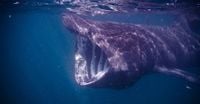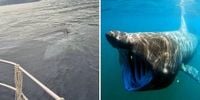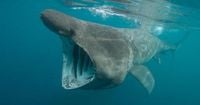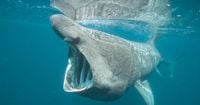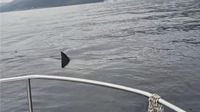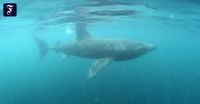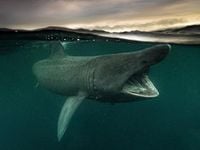A Croatian fisherman recently captured an extraordinary sighting off the coast of Rijeka, where a basking shark was filmed circling his boat in the Kvarner Bay. The video, posted on April 13, 2025, by the fisherman known as "Cali Mero" on Facebook, has since gone viral, garnering over 134,000 views. The footage showcases the impressive size of the basking shark, which can reach lengths of up to twelve meters and weigh as much as five tons.
The basking shark, scientifically known as Cetorhinus maximus, is the second-largest shark species in the world, following the whale shark. Unlike many of its predatory cousins, the basking shark is a gentle giant, primarily feeding on plankton by filtering up to 1.5 million liters of water per hour through its gills. This unique feeding method makes them harmless to humans, despite their intimidating size.
The sighting occurred just a few hundred meters from the Croatian coast, where the shark was filmed gliding gracefully near the surface. As the fisherman recorded the encounter, the shark's characteristic dorsal fin broke the water's surface, revealing its massive silhouette beneath. "A beautiful beast," Cali Mero commented on the video, reflecting the awe many viewers expressed in the comments section. Reactions ranged from admiration to humor, with some commenters joking about feeling terrified at such a close encounter.
While sightings of basking sharks in the Adriatic are not entirely unusual—more than 35 have been documented in the region—this particular encounter has drawn significant media attention. Ichthyologist Simon Weigmann noted that basking sharks are typically found in the Adriatic during the spring and summer months, especially as they follow their food sources closer to the coast.
Interestingly, the frequency of basking shark sightings in the Adriatic has been increasing, which some scientists attribute to changing ocean conditions. Weigmann explained that as warmer waters promote plankton growth, basking sharks may be drawn into shallower waters in search of food. However, this increased proximity to human activity can pose risks to the sharks, as they are prone to entanglement in fishing gear and face threats from overfishing.
Despite their gentle nature, basking sharks have faced significant population declines due to human activities. According to the International Union for Conservation of Nature (IUCN), the basking shark is listed as endangered, with estimates suggesting that fewer than 10,000 individuals remain globally. Between 1946 and 1997, over 100,000 basking sharks were killed in the Northeast Atlantic, primarily due to fishing practices.
The basking shark's future is further threatened by climate change, which could alter their habitat and food availability. Weigmann warned that as ocean temperatures rise, these sharks may be forced to migrate northward, potentially leaving the Mediterranean altogether.
In addition to basking sharks, the Mediterranean is home to around 47 different shark species. However, encounters with dangerous species are rare. Statistically, there is only one shark attack reported each year between the Strait of Gibraltar and the Bosphorus, with the last fatal attack in the Adriatic occurring in 1974.
This recent sighting serves as a reminder of the diverse marine life inhabiting the Adriatic Sea and the importance of protecting these gentle giants. The positive response to the video highlights a growing public interest in marine conservation and the need to raise awareness about the threats facing basking sharks and other vulnerable species.
As the video continues to circulate on social media, it has sparked conversations about the balance between human activity and marine ecosystems. The fisherman’s experience has not only captivated viewers but also provided an opportunity to educate the public about the ecological significance of basking sharks and the conservation efforts needed to ensure their survival.
In conclusion, the majestic basking shark sighting off the coast of Rijeka has not only thrilled local observers but is also a call to action for marine conservation. As we continue to explore and appreciate the wonders of our oceans, it is crucial to protect these remarkable creatures for future generations.
